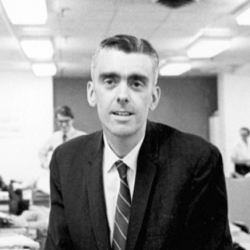 The New York Times‘ incomparable obituarist Margalit Fox did herself proud yesterday with a fine account of the life of McCandlish Phillips, the incomparable reporter who left the Times in 1973 to devote himself to the little Pentecostal congregation he helped found in upper Manhattan. Fifteen years ago, Phillips was the subject of a good New Yorker profile by Ken Auletta, but Fox does the job better at one-quarter the length.
The New York Times‘ incomparable obituarist Margalit Fox did herself proud yesterday with a fine account of the life of McCandlish Phillips, the incomparable reporter who left the Times in 1973 to devote himself to the little Pentecostal congregation he helped found in upper Manhattan. Fifteen years ago, Phillips was the subject of a good New Yorker profile by Ken Auletta, but Fox does the job better at one-quarter the length.
At the Times, Phillips specialized in metropolitan features, bringing to them a remarkable eye for detail, brilliant turns of phrase, and a perfect deadpan delivery. He was a dogged investigator and a master craftsman.
He is most celebrated for his story about Daniel Burros, a sometime official in the American Nazi Party who was then head of the state Ku Klux Klan. Times executive editor Abe Rosenthal got a tip that Burros was originally Jewish and Phillips nailed it down. He located Burros, “a round, short, sallow young man who looked a little like a small heap of misery”–and who threatened to kill him if he published an account of his background. When the story appeared on the Times‘ front page, what Burros did was commit suicide.
Fox wraps up the obit with a kicker worthy of her subject:
On the afternoon of Oct. 31, 1965, [Times managing editor Arthur] Gelb phoned Mr. Phillips to tell him, very gently, that Mr. Burros had shot himself.
“What I think we’ve seen here, Arthur,” Mr. Phillips replied, “is the God of Israel acting in judgment.”
Auletta tells the story differently, with a quote from Rosenthal that bears all the marks of that editor’s penchant for self-aggrandizement: “He said, and this was the first time his religion entered into his work, ‘It was the will of God’—it gives me shivers to say it!—’and you were the instrument of God!'” I believe the Gelb version.
In his later years, Phillips considered himself part of the Christian right, but he more resembled one of those Christ-haunted evangelicals that Flannery O’Connor loved to write about. He kept a Bible on his desk at the Times, and–Rosenthal notwithstanding–seemed to approach journalism as a species of ministry. Here’s how he ended a piece on media ethics he wrote for the Washington Post a decade ago:
Newspapers and broadcast news must, and they do, report accusations made by public figures against other such figures. When the newspaper itself levels the accusation, and presents its supporting case, it is much more deeply hurtful to the accused than the former is.
Always remember that, in public accusation, the irreducible, primary, essential requirement is that it be factually accurate. If it truly is, you have every right to take it to print or on air, and things will likely be better for it.
Newspapers and news networks should function as the liver of the body politic, not the spleen. God help you. Bear in mind that He will later be your judge.
When he resigned from the Times to work full time for the New Testament Missionary Fellowship, Phillips hoped to be able to bring about a great Christian awakening in New York City. I fancy he saw himself as trading in a ministry of justice for a ministry of love.





